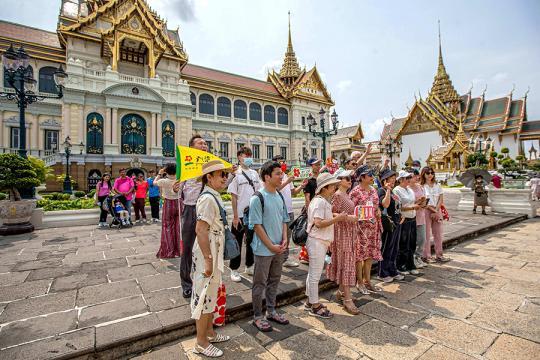Group tours come back on menu for overseas travelers
 0 Comment(s)
0 Comment(s) Print
Print E-mail China Daily, February 23, 2023
E-mail China Daily, February 23, 2023

Chinese tourists pose for a group photo at the Bangkok Grand Palace, Thailand, on Feb 7. (PHOTO/XINHUA)
China's outbound tourism market, which had been near dormant for the past three years, saw a strong rebound during this year's Spring Festival holiday, as the country optimized its COVID-19 prevention and entry policies in early January.
The global tourism industry will get a strong boost as China, one of the world's largest outbound tourism markets before the pandemic, resumed outbound group tours starting from Feb 6, industry experts said.
Spring Festival is the first long holiday since China resumed quarantine-free cross-border travel on Jan 8 after nearly three years since the onset of the COVID-19 pandemic, and Southeast Asian countries have gained traction among Chinese travelers.
During the seven-day break, the most popular overseas destinations for Chinese tourists were Bangkok, Phuket and Chiang Mai in Thailand, Indonesia, Malaysia and the Philippines, according to the China branch of US-based short-term lodging rental provider Airbnb.
More and more Chinese travelers have booked long-distance trips, with tours to the United Kingdom and France, which have rich tourism sources, and deep historical and cultural foundations, gradually recovering. In addition, Norway and the United Arab Emirates are among the top 20 outbound travel destinations for Chinese tourists.
Kong Zhiqiu, head of Airbnb's China business, said Chinese travelers had shown great enthusiasm for traveling abroad during Spring Festival as the country relaxed the cross-border travel restrictions, adding that overseas travel saw a good start over the holiday, and he is bullish on the prospects of outbound tourism this year.
Alibaba Group's travel branch Fliggy said bookings for flight tickets to overseas destinations skyrocketed more than fourfold year-on-year during the week-long holiday on the platform, while visa applications jumped more than 3.4 times compared with the previous year.
Thailand, the Maldives and New Zealand have become the fastest-growing tourist destinations among Chinese travelers, said the travel portal.
On Jan 20, the Ministry of Culture and Tourism announced starting from Feb 6, travel agencies could resume organizing group tours to 20 countries, such as Thailand, Indonesia, Cambodia, the Maldives, Sri Lanka, the Philippines and Malaysia.
During this year's Spring Festival, more than 2.87 million people traveled abroad, an average of 410,000 per day, up 120.5 percent from the previous Spring Festival holiday, according to Foreign Ministry spokeswoman Mao Ning.
Dai Bin, president of the China Tourism Academy, said China's outbound tourism is expected to see a robust recovery this year, which will inject strong impetus into the prosperity of the country's tourism industry, adding the tourism boom during the Spring Festival holiday set a good start for the full recovery of the industry.
Data from Trip.com Group, China's largest online travel agency, showed that outbound travel bookings surged 640 percent year-on-year during the holiday, while orders for overseas hotels and international flight tickets booked by Chinese mainland tourists both increased more than four times over the last Spring Festival.
Air tickets to Bali in Indonesia and Singapore surged about 30 times and eight times year-on-year, respectively, while bookings for hotels in Bangkok, Thailand, soared more than 33 times during the period, said Trip.com.
China's resumption of outbound group tours will also bolster the global tourism industry and the economic recovery of countries that depend heavily on tourism, experts said.
The World Tourism Organization forecasts that international arrivals will likely reach 80 percent to 95 percent of pre-pandemic levels in 2023, compared with 63 percent in 2022, despite lingering global headwinds.
Shen Jiani, a senior researcher at Trip.com, said with the increasing number of international flights and improvement in travel convenience, the outbound tourism industry is expected to see an evident boom during the May Day holiday.
With the gradual and orderly recovery of outbound tourism, people are showing an increasing demand for short-term home rentals and homestay services, which are now wide-ranging to satisfy the needs of various types of tourists, said Lai Zhen, an analyst at market research company iResearch.
However, compared with hotels, the recovery of the vacation rental market is slower due to its non-standardized management methods and community-based services, said Han Mengying, an analyst from market consultancy Analysys.



 Add your comments...
Add your comments...

